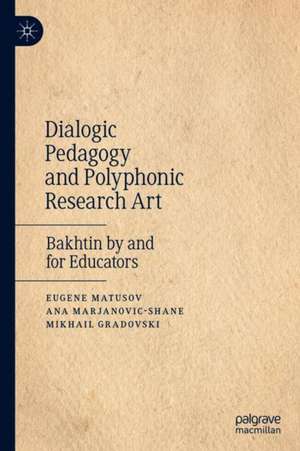Dialogic Pedagogy and Polyphonic Research Art: Bakhtin by and for Educators
Autor Eugene Matusov, Ana Marjanovic-Shane, Mikhail Gradovskien Limba Engleză Hardback – 5 apr 2019
Preț: 734.59 lei
Preț vechi: 895.84 lei
-18% Nou
Puncte Express: 1102
Preț estimativ în valută:
140.58€ • 145.93$ • 117.22£
140.58€ • 145.93$ • 117.22£
Carte tipărită la comandă
Livrare economică 24 martie-07 aprilie
Preluare comenzi: 021 569.72.76
Specificații
ISBN-13: 9781137580566
ISBN-10: 1137580569
Pagini: 338
Ilustrații: VIII, 326 p. 1 illus.
Dimensiuni: 155 x 235 mm
Greutate: 0.64 kg
Ediția:2019
Editura: Palgrave Macmillan US
Colecția Palgrave Macmillan
Locul publicării:New York, United States
ISBN-10: 1137580569
Pagini: 338
Ilustrații: VIII, 326 p. 1 illus.
Dimensiuni: 155 x 235 mm
Greutate: 0.64 kg
Ediția:2019
Editura: Palgrave Macmillan US
Colecția Palgrave Macmillan
Locul publicării:New York, United States
Cuprins
Introduction: Inspired by Bakhtin—The Aim, Focus, and History Behind This Research Project.- Part I Teaching Cases and Their Online Discussion.- Chapter 1.1: Two Teaching Cases with Online Forum Discussions.- Chapter 1.2: Standalone Teaching Cases.- Part II Analyses of Teaching Cases: Issues in Bakhtinian Pedagogy.- Chapter 2.1: What Is Bakhtinian Pedagogy for the Interviewed Bakhtinian Educators?.- Chapter 2.2: Ontological Engagement.- Chapter 2.3: The Educational Vortex in Bakhtinian Pedagogy.- Chapter 2.4: Teacher–Student Power Relations in Bakhtinian Pedagogy.- Chapter 2.5: Bakhtinian Pedagogy in Conventional Educational Institutions.- Part III Dialogic Research Art.- Chapter 3.1: Introducing Dialogic Research Art.- Chapter 3.2: Dialogic and Positivist Research in the Social Sciences.- Chapter 3.3: Summarizing Contrasts and Boundaries Between Positivist and Dialogic Research.- Part IV Conclusion: Lessons, Regrets, and Hopes.- Chapter 4.1: Lessons We Learned About Bakhtinian Pedagogy.- Chapter 4.2: Regrets About Our Polyphonic Dialogic Research.- Chapter 4.3: Hopes About the Future of Bakhtinian Pedagogy and Dialogic Research.- Chapter 4.4: Project Participants’ Holistic Judgments About the Book
Notă biografică
Eugene Matusov is Professor of Education at the University of Delaware, USA, and Editor-in-Chief of Dialogic Pedagogy: An International Online Journal. He investigates and works with sociocultural and Bakhtinian dialogic approaches to education.
Ana Marjanovic-Shane is an Independent Scholar and Deputy Editor-in-Chief of Dialogic Pedagogy: An International Online Journal. Her research interests include dialogue, democracy, and drama in education.
Mikhail Gradovski is Associate Professor of Social Education at the University of Stavanger, Norway. He teaches and researches using a dialogical approach.
Ana Marjanovic-Shane is an Independent Scholar and Deputy Editor-in-Chief of Dialogic Pedagogy: An International Online Journal. Her research interests include dialogue, democracy, and drama in education.
Mikhail Gradovski is Associate Professor of Social Education at the University of Stavanger, Norway. He teaches and researches using a dialogical approach.
Textul de pe ultima copertă
This book presents voices of educators describing their pedagogical practices inspired by the ethical ontological dialogism of Mikhail M. Bakhtin. It is a book of educational practitioners, by educational practitioners, and primarily for educational practitioners. The authors provide a dialogic analysis of teaching events in Bakhtin-inspired classrooms and emerging issues, including: prevailing educational relationships of power, desires to create a so-called educational vortex in which all students can experience ontological engagement, and struggles of innovative pedagogy in conventional educational institutions. Matusov, Marjanovic-Shane, and Gradovski define a dialogic research art, in which the original pedagogical dialogues are approached through continuing dialogues about the original issues, and where the researchers enter into them with their mind and heart.
Caracteristici
Presents diverse Bakhtinian dialogic pedagogies through a selection of unique teaching cases Introduces a new paradigm of dialogic polyphonic research art in a critical dialogue about Bakhtinian pedagogy Examines important issues of Bakhtinian ethical dialogic framework including: ways diverse educators conceptualize being Bakhtinian, importance of students’ ontological engagement, power relationships between teachers and students, and tensions between Bakhtinian educational philosophy and practice and conventional educational institutions
